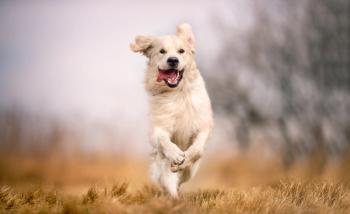
Mind games for competitive horses (Proceedings)
The goal of this presentation it to identify stressors for the competitive horse, learn how to prepare the competitive horse and how to keep the competitive horse motivated.
The goal of this presentation it to identify stressors for the competitive horse, learn how to prepare the competitive horse and how to keep the competitive horse motivated. Some potential stressors for the competitive horse will be discussed such as environmental and dietary stressors, Travel and Transportation stress, Injuries and Illness and training regimen.
Mind games for competitive horses
Mentally preparing them for competition, isolation and artificial environments
The goal of this presentation it to:
- Identify stressors for the competitive horse
- Learn how to prepare the competitive horse
- Learn how to keep the competitive horse motivated
What are some potential stressors for the competitive horse?
- Nature of horses: All change is bad
- Environmental Stressors: Social interactions (horses, care takers), general daily routine disruptions
- Dietary variations: Colic, Gastric ulcers, weight loss
- Travel/Transportation
- Injuries/Illness
- Training regimen
1. Nature of horses: All change is bad
- How about stress in natural settings, do they exist?
- Horses are prey animals à equipped to deal with stress
- Adapting behavior keeps them safe in nature
- Behavior has to be adapted quickly all the time: "Fight or Flight” response
- How does the body handle stress? What happens in the “Flight and Fight” response?
- Stress activates the autonomic NS, which leads to a sympathetic response in the body: Adrenal gland stimulated, HR increases, Pupils dilated, this has an effects on many organ systems.
- How is this response helpful?
- Increase in heart rate, blood pressure and respiration: Pumping more blood and oxygen to the important muscles
- Increased blood glucose: Rapid energy
- Pupils dilate: Sharpening of senses
- Prioritizing: Increased blood supply to peripheral muscles and heart, and brain; decreased blood supply to digestive system
- Secretion of Adrenaline and other stress hormones: Further increases this response
- Secretion of endorphins: Natural painkillers, providing an instant defense against pain.
Stress also manifests in behavior problems: Resistance, aggression, fear, anxiety, stereotypic behaviors. Chronic Stress and distress leads to compromised welfare, maladaptive behaviors and behavior changes: physical and/or psychological.
Which Horses become good competition horses? Nature and Nurture
2. Environmental stressors: New environment: Smells, noises, visual trigger, size of confinement, change in exercise surfaces, new Social structures
- How to prepare the horse?
- Getting horses used to many different situations, housing types, footing types and others early on; horses that habituate quickly are better equipped and more relaxed!
- How to prevent problems? Allow time to adapt/habituate when in any new environment, bring familiar visual or olfactory cues from home, be aware of your horses social needs, bring a friend (social facilitation).
If everything else changes, the human needs to be consistent!
3. Dietary variations and stress leads to dehydration, colic, gastric ulcers and chronic weight loss
How to prevent dietary stress: maintain feeding schedule and routine, feed high quality feed, increase roughage, allow regular grazing and foraging, use feed dispensing toy's and enrichment
4. Transportation stress:
The horse on the move is exposed to nearly every recognized potential stressor factor as well as respiratory infections and gastric ulcers. Studies have suggested that loading and unloading are considered most stressful. The stress response decreases with repeated transportation, suggesting habituation. Driving to a destination entails not a continuous constant stressor, coping with changes in speed, road surface, and turns will require some form of physical fitness from the horse.
- How to prevent transportation stress: Start early, use classical conditioning and positive reinforcement, social facilitation, gradual introduction, load on regular basis, so it becomes routine, always take your time for loading and unloading-don't rush!
- How to prepare? Always keep the trailer in good working order, Trailer in a safe location - Footing, other distractions, load on regular basis, so it becomes routine start early: Take your time-don't rush!
- Traveling problems arise: Fear, Balance problems, Footing, Trailer comfort, Suspension, Social interactions, Direction of travel, Length of travel
5. Injuries/illness: Competition horses are athletes, they are at higher risk for injury and illness. Is the horse ready?
How to prevent and prepare? Regular Vet checks, Vaccinations, DW, Tack checks, Hoof care, Dental care, Nutritional demands, TLC, Nutraceuticals, Cross training, appropriate rest periods
6. Training regimen
Training is most rapid and consistent when training related stress is minimized and when training practices match a horse's mental and physical abilities. A good trainer has realistic expectations for the horse, is aware of physical and mental limitations that could affect the quality of training outcome and picks the right horse for the job to minimize training stress. The training methods used have to be positive – training has to be rewarding and motivating. Punishment and harsh methods lead to conflict and learned helplessness. To maintain motivation, work sessions should be short, breaks in session should be appropriate, new skills should be practiced while old ones should be mastered, training should be based on command – response - reward approach, and it is important that all session end on a good note, cross training should be implemented in all disciplines.
Newsletter
From exam room tips to practice management insights, get trusted veterinary news delivered straight to your inbox—subscribe to dvm360.




